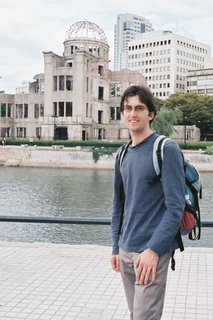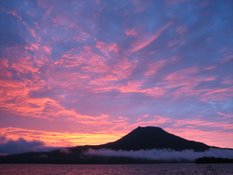
This Christmas I sent a postcard to friends and family giving the usual update of a Christmas card. Here is the text of the card, in case you didn't get one:
Dear friends and family, I'm back with my Christmas postcards so that means that I'm making more than $7,000 this year! Where have I been since my Christmas 2002 card? I moved to Monterey, California to study at the Monterey Institute of International Studies for an MA in Teaching English to Speakers of Other Languages. I graduated in May of this year. Now I am an assistant teacher of English at a private, Christian junior high school in the Kansai area of Japan. It is my first experience to work in a country where I haven't learned the language before I arrived. Nevertheless, Japan is a daily fascination of food, traditions, technology, and gracious people. Six weeks into my stay here I took a school trip to Hiroshima. We visited the Atomic Bomb Dome and the Peace Memorial Park. Before I waffled on the USA's use of the bomb to kill at least 80k civilians because it would save American lives. When I left, I couldn't imaging putting a national label on life to justify saving one and sacrificing another with such a horrendous act. If everyone could visit Hiroshima, I think that we could have peace on earth much sooner. With peaceful wishes for Christmas & the New Year
My motive was to share my personal transformation of viewpoint after visiting the Peace Museum in Hiroshima. I wanted to make a connection between the building behind me in the picture and peace at Christmas. When I went home for Christmas, some people told me that my Christmas card was too political. In retrospect, I think that I could have worded the card differently to focus more on peace instead of who did what to whom. When I returned to Japan after the Holidays, I received a letter from a friend who has had significant experience in nuclear physics. He had a unique perspective on what I wrote in my card and I would like to share it with you. Here is what he wrote:
(December 19, 2005) Dear Jeff,
Circa 1947 I wrote a paper for my international relations professor on the subject of the decision to use the atomic bomb. This was at Brown University. My conclusion was that it should have been used on a military area with warning and not on a city, no matter how much war industry it represented. Interestingly Kyoto was on teh top five list and was ahead of Hiroshima. The secretary of state took Kyoto off the list before Truman made a decision because he, the secretary, knew Kyoto was a very important historical and cultural center, having been the capital in years gone by...
The bombing of Dresden and the fire bombing of Tokyo, particularly the latter may have caused more deaths. No matter how you slice it, war tends to drag all parties into a whirlpool of depravity. In this case a great deal of soul searching went into the decision, but the decisionn-makers had no concept of the awfulness of the weapon. Today, people generally, and many political types have no concept whatsoever. I worked for the Los Alamos Scientific Laboratory and participated in bomb tests in the early 1950s, and being a physicist and all, had a notion, but it was not until I witnessed explosions and participated in the initial test of the hydrogen or fusion weapon did I begin to see what was implied. I became acquainted with Ernest Pollard, a physicist at MIT who worked at which he self published. It is a novel about the detonation of one low yield hydrogen bomb over NYC [New York City]. He describes in detail the effect on the United States. Aside form the metropolitan NY area, the entire country was affected because of the interrelated nature of our society and civilization. It was terribly edited, and I volunteered to redo it and have it republished; however it was too much of an emotional experience, and I did not need that sort of thing to deal with. He asked that I write a chapter about the effect on the cities and towns on the Long Island Sound extending all the way to RI [Rhode Island].
I think the North Koreans and the Iranians must be disarmed. The Russian arsenal must be controlled. I am under the impression that if weapons are not "refurbished" they tend to degrade, and if detonated will not do as much damage, but nevertheless spread a lot of radioactive material over the countryside, and with age they can become duds. How old or how probable this is, is not known to me. The US arsenal has been shrinking, and since the end of the cold war has dropped by 75%. There are less than 5000 weapons in the US inventory, and I understand it is being reduced monthly. It is a major project, and as you know we have given money to Russia to do the same. There is a book by Stansfield Turner (Adm. USN Ret.), former head of the CIA, that suggest how to put the genie back in the bottle. You might look it up. It may be called "The Trimtab Factor". I don't have time to look for it now in my library.[My friend emailed me back when I requested his permission to publish his letter on my blog. The real title of Adm. Turner's book is "Caging the Nuclear Genie" (ISBN 0-8133 3328 - 8)] It is curious that you chose this subject to re-establish contact at this time of year. Next time tell us about the beauty of Kyoto.
I suppose that I was trying to make a point by bringing up this issue at Christmas time. Can the message of the Prince of Peace, whose birth is traditionally celebrated on December 25, overcome the most destructive weapon that mankind has ever created? I believe it can. But if no one talks about this possibility when most people are listening to the Christmas message, then I think that people are less likely to remember it when faced with a nuclear decision in the future.
As a "child of the 80s" I can remember the fear of launching an array of nuclear weapons between the USA and USSR before the end of the cold war. I think the "children of the 00s" may have a similar feeling about people who want to detonate just one nuclear weapon to make a statement for their cause. The Message of the Man who blessed peacemakers is no less relevant today than in the 80s for bringing peace through nuclear nonproliferation and disarmament.





No comments:
Post a Comment